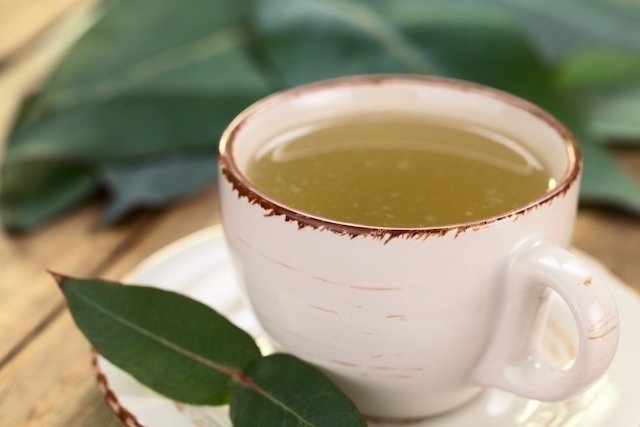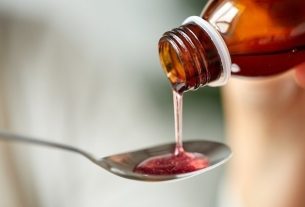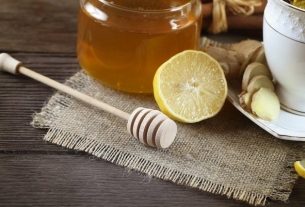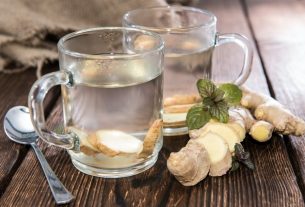Guaco tea has bronchodilator, anti-asthmatic and expectorant properties, and is generally used to treat respiratory problems, such as bronchitis, flu, asthma and persistent cough.
Guaco tea can be combined with honey, which has antiseptic and antibiotic properties, or with plants such as ginger and eucalyptus, which have expectorant, antimicrobial, decongestant and anti-inflammatory activity.
In addition to being consumed as tea, guaco can also be used to prepare syrups and tinctures, and can be purchased in pharmacies, health food stores and some street markets. Discover the health benefits of guaco.
Some teas that can be prepared with guaco are:
1. Guaco tea with honey
Guaco with honey combines the bronchodilator and expectorant properties of this plant with the antiseptic and calming properties of honey.
Ingredients:
- 1 tablespoon (3 to 5 g) of chopped dry or fresh guaco leaves;
- 1 dessert spoon of honey;
- 200 ml of water.
Preparation mode:
In a pan or kettle, boil the water. Turn off the heat, add the guaco leaves, cover the pan and let it rest for 10 minutes. Strain the tea and add the honey, mixing well. It is recommended to drink up to 3 cups of this tea per day for up to 15 days.
This tea is not recommended for people with cancer, tuberculosis, diabetes or liver disease. It should also not be consumed by children, pregnant or breastfeeding women.
This tea is also not recommended for people who are allergic to honey, or who are using medications such as anticoagulants, antibiotics and anti-inflammatories.
2. Guaco tea with milk and honey
Hot milk hydrates the throat, helping to alleviate some symptoms such as runny nose, sore throat and cough. Honey has antioxidant and antimicrobial action, reducing inflammation of the throat and lungs.
Ingredients:
- 1 tablespoon (3 to 5 g) of chopped dry or fresh guaco leaves;
- 250 ml of semi-skimmed milk;
- 1 tablespoon of honey;
Preparation mode:
In a pan, add the milk and heat until it boils. After turning off the heat, add the guaco leaves, cover and let it rest for 10 minutes. Strain the drink, add the honey, mix well and serve the drink while it is still warm. Drink up to 3 cups of this tea per day.
This tea should not be consumed by people with tuberculosis, cancer, diabetes or liver disease. Likewise, it is not recommended for children, pregnant or breastfeeding women.
Furthermore, this tea is not recommended for people with lactose intolerance, allergies to milk protein or honey, nor should it be consumed by people who are using medications such as anticoagulants, antibiotics and anti-inflammatories.
3. Guaco tea with mint
Mint is a plant with antibacterial, antioxidant and anti-inflammatory properties, which helps reduce coughs and nasal congestion.
Ingredients:
- 1 teaspoon of chopped fresh guaco leaves;
- 1 teaspoon of fresh mint leaves;
- 200 ml of water.
Preparation mode:
Boil water in a pan or kettle. After turning off the heat, add the mint and guaco leaves, cover the pan and let it rest for 10 minutes. Strain the drink and drink up to 3 cups of this tea per day.
This tea should be avoided by children and people with reflux, hiatal hernia, cancer, tuberculosis, diabetes or kidney or liver disease. This tea should not be consumed by pregnant or breastfeeding women.
Furthermore, people who are using medications such as anticoagulants, antibiotics and anti-inflammatories should also avoid this tea.
4. Guaco tea with ginger
Ginger has anti-inflammatory, expectorant and antimicrobial effects, strengthening the immune system and helping to relieve coughs.
Ingredients:
- 1 teaspoon of chopped fresh guaco leaves;
- 2 to 3 cm of fresh ginger root;
- 200 ml of water.
Preparation mode:
In a pan, or kettle, place the water and ginger root, bringing to a boil for 5 to 10 minutes. Turn off the heat, add the guaco leaves, cover the pan and let it rest for 5 minutes. Strain the drink and drink up to 3 cups a day.
This tea is not recommended for people with cancer, tuberculosis, diabetes, liver disease, gallstones, stomach irritation or bleeding diseases. It should also not be consumed by children, pregnant or breastfeeding women.
This tea is not recommended for people who are using anticoagulant, antibiotic and anti-inflammatory medications. Furthermore, people who use medications to control high blood pressure and diabetes should only consume this tea under the guidance of a doctor.
5. Guaco tea with eucalyptus
This tea combines the properties of guaco, with the decongestant, expectorant and antimicrobial action of eucalyptus, combating coughs with phlegm caused by flu, colds or bronchitis, for example.
Ingredients:
- 1 teaspoon of chopped fresh guaco leaves;
- 1 teaspoon of chopped dry eucalyptus leaves;
- 200 ml of water.
Preparation mode:
In a pan or kettle, boil the water. Turn off the heat, add the guaco and eucalyptus leaves to the boiling water, cover and let it rest for 10 minutes, straining before drinking. Strain and drink 2 to 3 cups of this tea per day.
This tea is not recommended for children and people with digestive or gallbladder problems, reflux, hiatal hernia, cancer, tuberculosis, diabetes or kidney or liver disease. This tea should not be consumed by pregnant or breastfeeding women.
Furthermore, this tea is also not recommended for people who are using medications such as anticoagulants, antibiotics and anti-inflammatories.
6. Guaco tea with thyme
Thyme has anti-inflammatory and expectorant action, helping to dilute and eliminate secretions, making it a good option for relieving coughs.
Ingredients:
- 1 teaspoon of chopped fresh guaco leaves;
- 1 teaspoon of chopped thyme leaves;
- 200 ml of water.
Preparation mode:
Boil water in a pan. After turning off the heat, add the guaco and thyme leaves to the water, cover the pan and let it rest for 5 minutes. Strain and drink up to 3 cups of this tea per day.
This tea is not recommended for people with intestinal inflammation, cancer, tuberculosis, heart failure, diabetes or liver disease. It should also not be consumed by children, pregnant or breastfeeding women.
Furthermore, this tea is also not recommended for people who are using medications such as anticoagulants, antibiotics and anti-inflammatories.

Sign up for our newsletter and stay up to date with exclusive news
that can transform your routine!
Warning: Undefined array key "title" in /home/storelat/public_html/wp-content/plugins/link-whisper-premium/templates/frontend/related-posts.php on line 12
Warning: Undefined array key "title_tag" in /home/storelat/public_html/wp-content/plugins/link-whisper-premium/templates/frontend/related-posts.php on line 13




